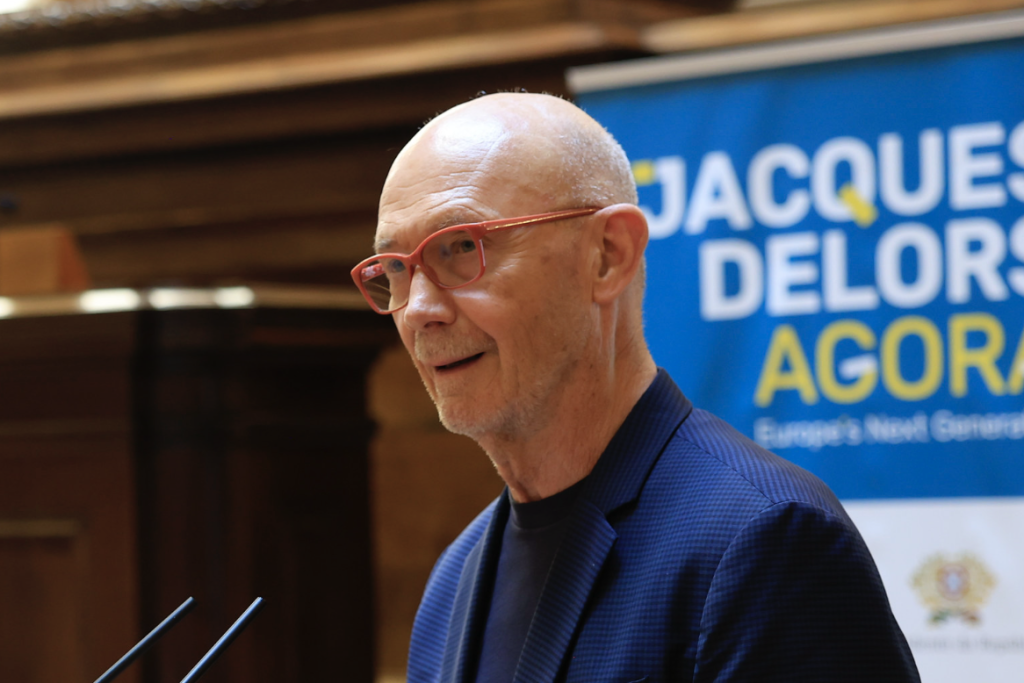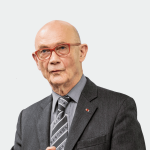Reflecting on the future of the European Union in light of Jacques Delors’ legacy
Speech given on 1 July 2024, Assembleia da Republica (Portuguese Parliament), Lisbon

The Jacques Delors Agora, held in Lisbon from 1st to 4th July 2024 and organised jointly by the Académie Notre Europe, the Scuola di Politiche and the Academia Europea Leadership, brought together around 130 young people from across Europe to engage with decision-makers and experts on the challenges facing the European Union. This gathering honoured the legacy of Jacques Delors, who passed away in December 2023, and featured discussions on key topics such as geopolitical and economic challenges, political reforms, and the green and digital transitions. During the event, Pascal Lamy, Coordinator of the Jacques Delors Think Tank Network, delivered a keynote speech that encapsulates the spirit of this important dialogue, reflecting on the future of the European Union in light of Delors’ enduring influence.
Good afternoon to you all,
Jacques Delors would be immensely proud to see you all here today in Lisbon, gathered in his honour. With that in mind, I aim to pay tribute to his legacy by addressing this crucial question: How can Jacques Delors’ vision guide our reflection on the future of the European Union—a future that now rests not in the hands of his generation, nor mine, but yours?
To answer this question, I will first outline the salient features of Delors’ intellectual and political legacy, before considering how they resonate in today’s world – a world vastly different from the one in which he presided over the European Commission.
I. JACQUES DELORS’ VISION
Let me start with the two major aspects that make up Delors’ vision: his idea of progress and his understanding of society. I bring up these two because, for Delors, politics was always about how to drive progress while shaping a just society— each essential to the other.
Delors’ concept of progress
Delors’s notion of progress, central to his intellectual armoury and legacy, is anchored in the continuous improvement of human dignity. Over the course of his political career, Delors progressively shaped his vision of progress around three pillars: economic sustainability, social sustainability, and environmental sustainability.
Upon his arrival in Brussels in early 1985, Delors epitomised the classical social democrat, for whom the articulation between economic and social sustainability was the hallmark of social democracy. Essentially, he believed that a robust economy was necessary to build an effective social welfare system. This notion was neither novel nor groundbreaking.
However, by the time he departed Brussels, a decade later, he had integrated a third dimension: environmental sustainability. This evolution is particularly evident in his seminal work, the Commission’s White Paper of 1993, which encapsulates the interconnection between economic, social, and environmental sustainability.
Delors’ concept of society
Delors envisioned a person-centred society, organised in concentric circles, with human dignity at the centre. These circles represent different levels of belonging: the family, the city, the nation, the region, and ultimately, the planet.
For Delors, power, like society, must be organised. Delors was not an advocate of anarchy; rather, he posited that power should be structured according to two guiding principles: subsidiarity and solidarity. On the one hand, subsidiarity dictates that political authority should be exercised at the level closest to the individual, recognising that certain issues are best addressed locally, while others necessitate elevation to higher levels of governance. On the other hand, solidarity is essential for fostering a cohesive bond among the different spheres of belonging I have just mentioned.
This model may be simplistic, perhaps overly so, but we must strip it down to the basics to determine whether or not it applies today and in the future. In other words, do these concepts hold up in a world and European continent that have undergone profound transformations over the past three decades? Simply put, I argue that Delors’ vision remains highly relevant, albeit with one major similarity and two clear differences.
II. DELORS’S VISION REVISITED: NAVIGATING MODERN CHALLENGES
Embracing Sustainabilities
The enduring aspect of Delors’ vision is his idea of a society centred around the individual combined with the three dimensions of sustainability. This, I believe, is the key challenge for the European Union moving forward.
We have learned, sometimes the hard way, that the interplay between economic, social, and environmental sustainability is paramount for the EU’s future. However, we still face the challenge of reconciling our Soziale Marktwirtschaft, our social market economy model, with the green transition. More broadly, how can we effectively articulate these three driving forces for our society—economic, social, and environmental?
It is fair to say that we have yet to find the right approach. It is now the task of your generation to envision and craft the right mix of policies and investments that will manage to balance these key dimensions.
Reimagining Solidarity
Now, while the concepts of subsidiarity and solidarity remain relevant, the dynamics between them must evolve. This is not just a matter of choice; it is dictated by the realities of our contemporary world. Whether we accept it or not, we have become, in many respects, passive recipients of forces and events unfolding beyond our control in other regions of the world.
What we have seen recently is a more dangerous world, driven by the growing US-China rivalry. A more brutal world, marked by Russia’s invasion of Ukraine and the violent conflict between Hamas and Israel. And a more frightening world, as the planet faces an escalating environmental crisis. These are not just challenges—they are the challenges of our time. And none of this was even close to the forefront of political action 30 years ago.
To confront these, the EU needs more strength, more capacity, and above all, more statecraft. In my view, this calls for a new balance between subsidiarity and solidarity. Solidarity must take precedence and serve as the mainstay across all domains, since tackling these threats together necessitates a higher level of integration and unity among European countries.
Charting our future
Looking ahead, I would like to highlight an important issue raised by Vice President Šefčovič, the upcoming deliberation on the Multiannual Financial Framework (MFF), a hallmark of Delors’ legacy. The upcoming debates on this framework will be decisive for recalibrating the balance between solidarity and subsidiarity.
When Delors assumed the presidency of the European Commission, budgets were determined annually by Member states, lacking a coherent medium- to long-term strategy. His view was that the allocation of public money was too critical to be handled without sufficient political debate, but that yearly discussions lacked the depth and foresight necessary for effective governance of resources.
I believe he was right to establish a seven-year budget for the EU. However, this move created a situation where everything is on the table at once. As we approach 2025 and 2026, when the Commission will present and defend the next MFF, we can anticipate a scenario where expectations may exceed available resources —a classic case of “big feet and small shoes”. How this unfolds will be the central question of the next 5 years.
While the tool remains the same, the context for these discussions is markedly different from Delors’ time. We face pressing demands for increased resources to support Ukraine, bolster the EU’s strategic autonomy, finance the digital transition, combat climate change and biodiversity loss, and facilitate enlargement. These are just a few items on my wish list, offering a mere snapshot of the priorities that demand our attention.
À la Delors, these discussions will give rise to a compromise among the 27 Member states, each with its own spectrum of attitudes towards subsidiary and solidarity. While the differences in viewpoints among countries such as Spain, Germany, France, the Netherlands, and the UK were notable in the 1990s, today those divergences are much greater, as are the challenges ahead of us.
Thus, we must brace ourselves for an important debate that will shape the most pivotal deal of the next legislative term. All of you need to reflect on what this entails, recognising that, thus far, these conversations have not been adequately echoed in the public debate.
III. DELORS’ LEGACY TESTED: THE CURRENT VALUE CRISIS
The second major departure from Jacques Delors’s vision for the European Union lies in the issue of values. During his tenure, Delors acknowledged the distinctiveness of European values alongside those from other parts of the world and saw coexistence as essential. His approach was to nurture European values without imposing them on others, and vice versa – a relatively straightforward paradigm.
What Delors could not have foreseen, however, was the internal pressure these values would face within the European Union itself—a scenario that would have seemed unthinkable during his time leading the Commission in the 1990s. Delors’s vision rested on a fundamental belief: that as the EU expanded its democratic, liberal political system to include more nations, progress would move steadily forward, with no risk of backsliding. This assumption, however, has since proven to be misguided.
In our final conversations with him, just weeks before his passing, it was evident that he was pleased with the European Union’s commitment to the Green Deal, the protection of oceans and overall, with its leadership in global decarbonisation efforts—which he deemed absolutely vital. Yet, he was also deeply troubled by the rise of extremist movements, particularly the far right. He departed this world with a heart divided—one part content with the progress made, and another part saddened by these alarming developments.
CONCLUSION: A CALL FOR DEPOLARISATION
Delors possessed an extraordinary confidence in humanity’s capacity for consensus, believing that with the right questions and a conducive space for dialogue, agreement was within reach. He was a profoundly depolarising man.
In light of the current circumstances – and while I do not wish to be overly influenced by the events in my own country – I urge you to consider how Delors might have approached the challenges we confront today. I am convinced that he would have sought to understand the situation and then paint it in order to build the necessary bridges.
So, here is the duty I leave you with today: please use what you learnt about Delors and the EU to help depolarise our politics in order to overcome the formidable challenges the Europeans are facing.
Up to you, now!
Thank you for your attention.




